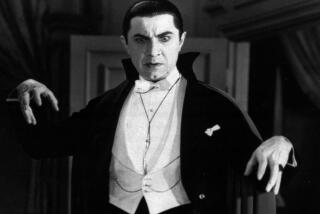Astral Weeks: Welcome to weird America
“My country is my family,” writes Ricky Rice as he concludes his apologia pro vita sua -- a.k.a Victor LaValle’s massive, heroically strange new novel, “Big Machine” (Spiegel & Grau: 378 pp., $25). “I like America.”
There’s something both dissonant and grin-tuggingly candid in his plainspoken admission. Ricky, after all, is an ex-(more or less) heroin addict; a onetime cash mule; an itinerant janitor who’s cleaned the toilets in several of upstate New York’s less-than-glamorous train stations; a now-chaste former serial impregnator of women; and one of the few child escapees of the charismatic religious cult led by three (weird) sisters called the Washerwomen. Not to mention all the bizarreness and violence that pack these pages. Yet, even as we’d half-expect any patriotic sentiment of his to be along the lines of, say, Allen Ginsberg’s “America” -- “America I’ve given you all and now I’m nothing” -- his proclamation seems just right.
That “like” is perfect -- a modest verb in place of the chest-thumping “love.” For a book with a dazzling array of flashy moving parts -- secret societies, backstories toggled for maximum effect, angels and demons, suicide squads recruited from among the homeless -- the language is more effective for being low key. This is not to suggest the sentences don’t have snap, just that they’re compact -- more toward the noir end of the dial, away from a more overtly lyrical or maximal style -- it’s comparable to the voice in some of Haruki Murakami’s novels. The vibe is similar: One odd encounter leads to another, with a phantasmal logic often laced with humor, the whole thing building up to a sort of monumental dreamwork.
Though Ricky Rice, with his heavy life baggage, is less of a cipher than the typical Murakami narrator, there is that sense of the protagonist as somnambulist, stumbling across haunting artifacts, trying to make connections. (“Nobody trusts anybody now, and we’re all very tired,” runs the novel’s epigraph, taken from John Carpenter’s movie “The Thing.”)
“Big Machine” itself roves across America -- call it that old, weird America, per Greil Marcus -- finding the surreal or supernatural (soul-sucking cats, swamp spirits) everywhere, from Vermont to the fictional Garland (read: Oakland), Calif., with blood and revelations in Florida, shocking bits of business in Cedar Rapids, Iowa, and an apartment complex in Queens.
Indeed, LaValle has cunningly framed the book to be about the gathering of bizarre events. Early on, Ricky gets whisked to the Washburn Library with a motley crew of other men and women -- all black -- with skeletons in their closets; they are the new crop of Unlikely Scholars, who spend their days in cushy surroundings, combing the country’s newspapers for news of the abnormal and uncanny.
“Doubt is the big machine,” one of the Washerwomen says to young Ricky. “It grinds up the delusions of men and women.” The title, then, announces LaValle’s great theme and his method: How much of this are you going to believe? What does it mean to finish -- and enjoy, and treat seriously -- a book like “Big Machine,” crammed with flights of fancy, point-blank showdowns, monsters stalking the parapets of sanity?
With “Big Machine,” LaValle, author of the story collection “Slapboxing With Jesus” (1999) and another novel, “The Ecstatic” (2002), confidently joins those idiosyncratic writers who have mapped out different portions of this Weird America. There’s a touch of Pynchon, of course, and I think I detect more than a trace of Richard Brautigan. (LaValle himself acknowledges horror writers Stephen King, Shirley Jackson, T.E.D. Klein, and “my man Ambrose Bierce.”)
The most pertinent precursor for “Big Machine,” though, is Ishmael Reed’s great, mind-bending mélange of a conspiracy novel, “Mumbo Jumbo” (1972), which defies intelligible summarization but involves a struggle between dual conspiracies with ancient roots (Egyptian religion, the Knights Templar) and the liberation of non-Western art from Western museums (otherwise known as the “Center for Art Detention”). “Big Machine” is as outwardly stable as “Mumbo Jumbo” is visually antic, but both books use their unconventional narratives (in particular, a focus on the machinations of sub rosa organizations and secret knowledge) to meditate on race in this country. These meditations are playful, entertaining and deadly serious.
“Did every story about black folks have to be such a downer?” Ricky Rice wonders in exasperation, a few seconds into a speech by the Dean, whom he and the other Unlikely Scholars report to. His own story, of course, will prove the exception to the rule: Beginning in the toilet, his experience somehow avoids a typical rags-to-riches (or needle-to-rehab) structure and gives us something haunting and fresh, its freakout tempos (there’s no way I’m telling you my favorite one) modeled on horror stories and other glorious pop culture detritus -- the way parts of “Mumbo Jumbo” read like creature-feature pastiche.
Lest “Big Machine” seem like an unbroken series of rich hallucinatory tableaux, I want to stress how appealing Ricky Rice’s voice is, and how funny a writer LaValle often is. Sometimes the yuks are observational -- it’s standup with a bite:
“And I remember all those flicks from the eighties, like the ‘Death Wish’ series, where you’d see street gangs with members from every racial group. Asian and black and Latino and white, maybe even a Native American guy. (You could tell because he wore a headband and had long, straight black hair.) Those gangs were meant to be menacing on-screen, but they always made me laugh. What crew was this? I’d wonder. Had gangs really figured out racial unity as the rest of us failed to grasp it? Those were some very enlightened thugs! I guess the directors didn’t want to offend anyone, but as a result they told everyone a lie.”
LaValle is also funny when he’s in gentle zinger mode (“It was like trying to fund the CIA with a lemonade stand”) and in flat-out silly mode: “Call me an ambulance,” Ricky gasps, in dire straits. “You’re an ambulance,” someone else says.
That’s a bad joke worthy of Pynchon himself.
Ed Park is a founding editor of the Believer and the author of the novel “Personal Days.” Astral Weeks appears monthly at www.latimes.com/books.
More to Read
The biggest entertainment stories
Get our big stories about Hollywood, film, television, music, arts, culture and more right in your inbox as soon as they publish.
You may occasionally receive promotional content from the Los Angeles Times.










